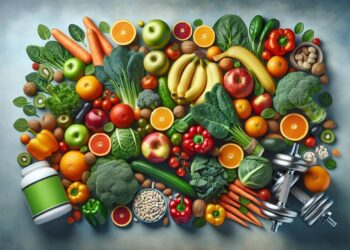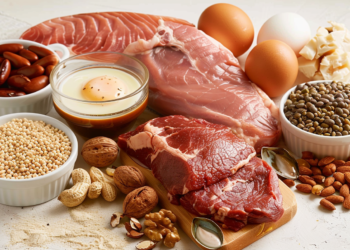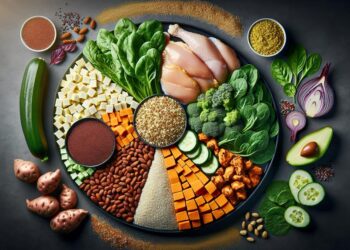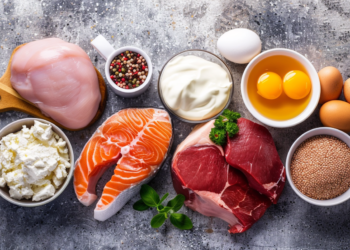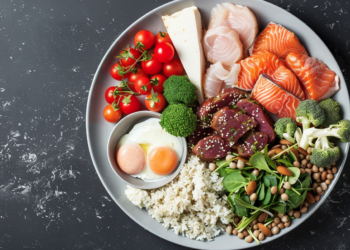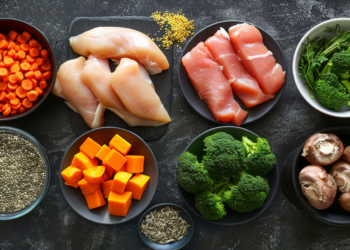Harness the power of lean proteins, complex carbs, and healthy fats to fuel your muscle growth and strength goals.
When aiming for muscle growth and strength, we rely on lean protein sources, complex carbohydrates, and healthy fats. Lean proteins like tofu or lentils are essential for muscle repair and strength. Complex carbs, such as sweet potatoes or quinoa, help fuel workouts and aid in muscle recovery. Healthy fats, like avocados and salmon, support muscle growth and overall wellness. Including these foods in your diet can enhance your workout results and boost muscle development. With the right nutrition, you can maximize your muscle gains and see improved strength.
Key Takeaways
- Tofu and lentils aid muscle repair and strength.
- Sweet potatoes and quinoa fuel workouts and aid recovery.
- Avocados and salmon support muscle growth and wellness.
- Including these foods enhances workout results.
- Right nutrition maximizes muscle gains and strength.
Lean Protein Sources
When aiming to maximize muscle growth and strength, incorporating lean protein sources into our diet is essential. Protein is the building block of muscles, and consuming an adequate amount is important for muscle repair and growth. For those seeking plant-based options, there are plenty of sources that can meet your protein needs. Foods like tofu, tempeh, edamame, lentils, chickpeas, and quinoa are excellent sources of plant-based protein. These options not only provide protein but also offer essential nutrients, fiber, and antioxidants that are beneficial for overall health.
Meal timing is another important factor to consider when it comes to maximizing muscle growth. It’s recommended to consume protein-rich meals or snacks within 30 minutes to two hours after a workout session. This window is known as the anabolic window, where your body is more receptive to nutrients to aid in muscle repair and growth. Additionally, spreading protein intake evenly throughout the day can also be helpful for muscle protein synthesis.
Incorporating lean protein sources into our meals and being mindful of meal timing can have a significant impact on muscle growth and strength. Whether opting for animal-based or plant-based protein sources, the key is to make sure an adequate intake to support our fitness goals. Remember, variety is key to obtaining a wide range of essential nutrients, so mix and match different protein sources to keep your meals exciting and nutritious.
Complex Carbohydrates

In our pursuit of maximal muscle growth and strength, incorporating complex carbohydrates into our diet is a crucial component. Complex carbohydrates are a great source of ideal energy for our workouts, aiding in muscle glycogen replenishment and overall performance. When it comes to carb timing, it’s important to consume complex carbohydrates both pre and post-workout.
Prior to our workout, consuming complex carbs like whole grains, sweet potatoes, or oats can provide the necessary energy to fuel our training sessions. These carbohydrates are broken down more slowly than simple sugars, ensuring a steady release of glucose into the bloodstream, which can help sustain energy levels throughout our workout.
Post-workout, our muscles are primed to replenish muscle glycogen stores, making it a prime time to consume complex carbohydrates alongside protein for muscle recovery and growth. Options such as quinoa, brown rice, or whole grain pasta can aid in this process, supporting muscle repair and growth after intense training sessions.
Healthy Fats

To optimize muscle growth and strength, incorporating healthy fats into our diet is a strategic choice that complements the benefits of complex carbohydrates. Healthy fats are essential for gains as they provide a concentrated source of energy and support various bodily functions important for muscle development.
Here are three nutrient-dense options that can help enhance muscle growth and strength:
- Avocados: Avocados are rich in monounsaturated fats, which can help reduce inflammation and improve overall heart health. They also contain vitamins E and K, necessary for recovery and bone health, respectively.
- Salmon: Salmon is a great source of omega-3 fatty acids, which have anti-inflammatory properties and can aid in muscle repair post-workout. Omega-3s also support joint health, vital for overall strength and mobility.
- Nuts and Seeds: Almonds, walnuts, chia seeds, and flaxseeds are packed with healthy fats, fiber, and antioxidants. These nutrient powerhouses can help regulate blood sugar levels, promote satiety, and provide sustained energy for effective workouts.
Incorporating these nutrient-dense healthy fats into our diet not only supports muscle growth and strength but also contributes to overall well-being. Remember, balance is key, so aim for a variety of healthy fats in moderation to reap the benefits they offer.
Frequently Asked Questions
How Can I Optimize My Pre-Workout Nutrition for Muscle Growth?
To optimize pre-workout nutrition for muscle growth, we focus on protein and carbohydrate timing. By strategically consuming meals and nutrients before training, we fuel our bodies efficiently, enhancing performance and aiding in muscle development.
Are There Specific Foods to Avoid That Can Hinder Muscle Development?
Avoiding certain foods can hinder muscle development. Common misconceptions and dietary myths suggest that processed foods, excessive sugars, and trans fats are harmless. In reality, these can impede progress. Opt for whole, nutrient-dense options.
Can Intermittent Fasting Impact Muscle Growth and Strength?
Intermittent fasting can impact muscle growth positively. Timing workouts during the eating window can optimize fasting benefits for muscle development. Planning meals strategically is crucial to support strength gains while fasting.
What Role Do Vitamins and Minerals Play in Muscle Recovery?
Vitamins and minerals are essential for muscle recovery. Nutrient timing impacts performance, while electrolyte balance aids in recovery. Ensuring a diverse diet rich in these nutrients supports muscle health and overall well-being.
Is It Necessary to Track Macronutrient Ratios for Muscle Building?
We find tracking macronutrient ratios beneficial for muscle building. Protein distribution aids muscle repair, but overall caloric surplus fuels growth. Monitoring macros guarantees we optimize our nutrition for muscle gains, supporting our fitness goals effectively.
Conclusion
So, there you have it folks! Remember, if you want to build muscle and strength, just eat lean protein, complex carbs, and healthy fats.
It’s as easy as pie…wait, maybe not pie, but you get the idea. So go ahead, indulge in those chicken breasts, sweet potatoes, and avocados. Your muscles will thank you later.
And hey, maybe one day you’ll be flexing in front of the mirror like a true bodybuilder. Keep eating, keep lifting, and keep growing!





